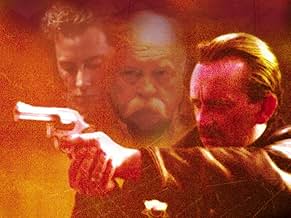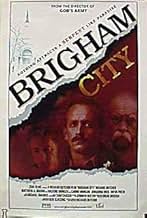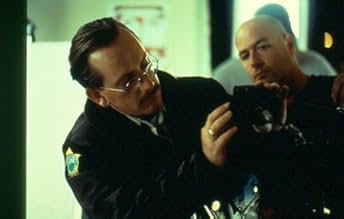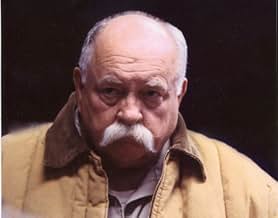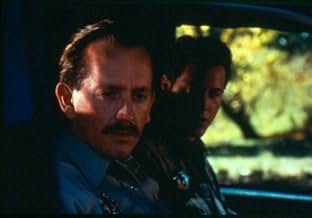AVALIAÇÃO DA IMDb
6,6/10
1,7 mil
SUA AVALIAÇÃO
Adicionar um enredo no seu idiomaThe sheriff of a small Utah community searches for a serial killer.The sheriff of a small Utah community searches for a serial killer.The sheriff of a small Utah community searches for a serial killer.
- Direção
- Roteirista
- Artistas
- Prêmios
- 3 vitórias no total
Wendy Hoop
- April
- (as Wendy Gardiner)
Avaliações em destaque
First and foremost, Brigham City is a murder mystery. But it's also a story about how a murder can make victims of everyone who lives in a small town that is supposed to be safe.
While Brigham City is set in a predominantly Mormon town in Utah, but it could just have easily been any small town in America and the people could have been of any faith (or none at all). The people of the town feel safe and secure. No one locks they're doors. Everyone knows everyone else. Then their sense of security is shattered by a spree of vicious murders. Suddenly everyone is on his guard and quick to distrust those they have trusted for years.
The plot of Brigham City really has the feel of a traditional Hollywood thriller, the addition of Mormon culture give the film a higher level of depth. While the film is about Mormons and provides some brief glimpses into their beliefs and customs, it does not attempt to convert audience members to the LDS church.
In his second film, Richard Dutcher does an admirable job of bringing this story to the big screen. The film feels more professional and polished than his previous entry (God's Army), but at the same time doesn't feel like the typical Hollywood fare.
What works in this movie is Dutcher's attention to detail and the depth of the characters. I was pleased to see how the violence in the movie was implied rather than shown directly. I was also impressed by the casting of Wilford Brimley. There may have been a commercial reason for him being attached to the film, but his presence gave the film a feeling of familiarity.
Dutcher also makes great use of camera angles and music to cast each person as a suspect. This is also the film's low point, as it is used so much it begins to bog down the story. Non-Mormons may feel that certain points of the movie are a bit too preachy.
All in all, Brigham City is a decent movie. I don't recommend it for younger children, as some of the implied violence may be disturbing, but most people over 13 will probably be drawn into the story the same way you would a traditional Hollywood thriller.
You might ask why I (a non-Mormon) interested in seeing Brigham City. Since I manage the movie theater where the film is playing I wanted to be able to give an informed opinion about the movie. As a movie fan, I was interested to see how Brigham City stood up to other Hollywood and independent films. As a person, I was interested for the glimpse of Mormon culture the film provided.
While Brigham City is set in a predominantly Mormon town in Utah, but it could just have easily been any small town in America and the people could have been of any faith (or none at all). The people of the town feel safe and secure. No one locks they're doors. Everyone knows everyone else. Then their sense of security is shattered by a spree of vicious murders. Suddenly everyone is on his guard and quick to distrust those they have trusted for years.
The plot of Brigham City really has the feel of a traditional Hollywood thriller, the addition of Mormon culture give the film a higher level of depth. While the film is about Mormons and provides some brief glimpses into their beliefs and customs, it does not attempt to convert audience members to the LDS church.
In his second film, Richard Dutcher does an admirable job of bringing this story to the big screen. The film feels more professional and polished than his previous entry (God's Army), but at the same time doesn't feel like the typical Hollywood fare.
What works in this movie is Dutcher's attention to detail and the depth of the characters. I was pleased to see how the violence in the movie was implied rather than shown directly. I was also impressed by the casting of Wilford Brimley. There may have been a commercial reason for him being attached to the film, but his presence gave the film a feeling of familiarity.
Dutcher also makes great use of camera angles and music to cast each person as a suspect. This is also the film's low point, as it is used so much it begins to bog down the story. Non-Mormons may feel that certain points of the movie are a bit too preachy.
All in all, Brigham City is a decent movie. I don't recommend it for younger children, as some of the implied violence may be disturbing, but most people over 13 will probably be drawn into the story the same way you would a traditional Hollywood thriller.
You might ask why I (a non-Mormon) interested in seeing Brigham City. Since I manage the movie theater where the film is playing I wanted to be able to give an informed opinion about the movie. As a movie fan, I was interested to see how Brigham City stood up to other Hollywood and independent films. As a person, I was interested for the glimpse of Mormon culture the film provided.
Several days after seeing this movie, I'm still thinking about it. That's about the highest compliment I can pay to a film.
As in all great films, the power of _Brigham City_ lies beneath the surface. The whodunit plot is merely a prop for the exploration of issues that affect us all, especially those of us who claim some sort of religious faith. The age-old question of whether innocence and wisdom can coexist is asked, never answered, and in the end eclipsed by a more pertinent question: If redemption is available for those who have lost their innocence, is it also available for those who fail through lack of wisdom?
As in all great films, the power of _Brigham City_ lies beneath the surface. The whodunit plot is merely a prop for the exploration of issues that affect us all, especially those of us who claim some sort of religious faith. The age-old question of whether innocence and wisdom can coexist is asked, never answered, and in the end eclipsed by a more pertinent question: If redemption is available for those who have lost their innocence, is it also available for those who fail through lack of wisdom?
Having childhoods in the same hometown (Mt. Vernon, IL), Dutcher and I come from completely different worlds as adults. I was impressed with his direction in this film, the tension created and maintained. The characters show a refreshing honesty in looking at where they have been.
It's difficult to watch Richard Dutcher's very capable and entertaining, `Brigham City,' without choking on the intended Mormon zeitgeist that permeates the story. Dutcher goes to considerable length to successfully portray Mormons as loving, decent, church-going friends and neighbors as justification for suspending constitutional rights and imposing a theocracy.
Dutcher plays Wes Clayton, Sheriff of a fictional small town in Utah called Brigham City. Clayton is also the `Bishop' for Mormons in that area, which makes him unquestionably the most influential man in town. A widower who lost his wife and only son in a traffic accident years ago, Clayton is permanently saddened by the loss. Dutcher portrays him with a kindly stoicism, a righteous man who takes both his sacred and secular responsibilities seriously.
When a young woman from California is found murdered in an old barn on the outskirts of town, Clayton calls in the FBI and washes his hands of the investigation, telling his enthusiastic young deputy that this has nothing to do with Brigham City, that it was a random act that could have happened on any number of freeway off ramps. It's something Clayton desperately wants to believe; that Brigham City is a paradise of the faithful and as a result enjoys a divine immunity from the evil `out there' in the world. His duty as both Sheriff and Bishop is to keep it that way. Unfortunately, a second body is discovered, and Clayton is forced to realize that his `Eden' has been invaded by the outside world, and his duty now requires him to get involved.
His ensuing investigation makes your skin crawl. Clayton's methodology is autocratic and fascist. His first suspicion is that the murderer must be an outsider or a `Jack Mormon;' consequently, he and his deputies hang out at the only bar in town, collecting beer bottles and glasses to dust for fingerprints, hoping for a match from the FBI database. When the town's convenience store clerk disappears, Clayton ratchets up the police state, using his authority as Bishop to order church members to go out two by two, as in their missionary days, and search every house in town, lack of a search warrant notwithstanding. When one of them objects by saying he has to be at work, Clayton responds that nothing is more important than the life of the missing girl. When one of the town members rightfully refuses to allow a search of her house, he forces his way in.
Despite deep faith, good intentions, and concern for another human life, fascism in the name of Jesus is still fascism. Clayton's heavy-handedness is precisely why the Bill of Rights exists. While `Brigham City' is a good movie in terms of characterization and story, it is also a very frightening parable about the dangers of religion, and remarkably parallels our nation's attitude and course of action in the aftermath of September 11th. Essentially, `Brigham City' is a microcosm of what the christian right ultimately envisions as America's future, and it's no place where I'd want to live.
Dutcher plays Wes Clayton, Sheriff of a fictional small town in Utah called Brigham City. Clayton is also the `Bishop' for Mormons in that area, which makes him unquestionably the most influential man in town. A widower who lost his wife and only son in a traffic accident years ago, Clayton is permanently saddened by the loss. Dutcher portrays him with a kindly stoicism, a righteous man who takes both his sacred and secular responsibilities seriously.
When a young woman from California is found murdered in an old barn on the outskirts of town, Clayton calls in the FBI and washes his hands of the investigation, telling his enthusiastic young deputy that this has nothing to do with Brigham City, that it was a random act that could have happened on any number of freeway off ramps. It's something Clayton desperately wants to believe; that Brigham City is a paradise of the faithful and as a result enjoys a divine immunity from the evil `out there' in the world. His duty as both Sheriff and Bishop is to keep it that way. Unfortunately, a second body is discovered, and Clayton is forced to realize that his `Eden' has been invaded by the outside world, and his duty now requires him to get involved.
His ensuing investigation makes your skin crawl. Clayton's methodology is autocratic and fascist. His first suspicion is that the murderer must be an outsider or a `Jack Mormon;' consequently, he and his deputies hang out at the only bar in town, collecting beer bottles and glasses to dust for fingerprints, hoping for a match from the FBI database. When the town's convenience store clerk disappears, Clayton ratchets up the police state, using his authority as Bishop to order church members to go out two by two, as in their missionary days, and search every house in town, lack of a search warrant notwithstanding. When one of them objects by saying he has to be at work, Clayton responds that nothing is more important than the life of the missing girl. When one of the town members rightfully refuses to allow a search of her house, he forces his way in.
Despite deep faith, good intentions, and concern for another human life, fascism in the name of Jesus is still fascism. Clayton's heavy-handedness is precisely why the Bill of Rights exists. While `Brigham City' is a good movie in terms of characterization and story, it is also a very frightening parable about the dangers of religion, and remarkably parallels our nation's attitude and course of action in the aftermath of September 11th. Essentially, `Brigham City' is a microcosm of what the christian right ultimately envisions as America's future, and it's no place where I'd want to live.
I live in Mapleton, UT where it was filmed, and am LDS. I enjoyed the movie. If you don't understand the Church's dogma then the end of the movie may not mean that much to you.
I enjoyed the suspense and liked the acting. You can say what you want about the religon and the politics but it's not much different then other places in the world. If you saw the movie Chocolat, you can see the same thing there.
I enjoyed the suspense and liked the acting. You can say what you want about the religon and the politics but it's not much different then other places in the world. If you saw the movie Chocolat, you can see the same thing there.
Você sabia?
- CuriosidadesNone of the actors or crew knew whom the real murderer was prior to the last scene being filmed. The actors and crew filming the scene had to sign a contract saying they would not reveal which one of them played the murderer, until after the movie was officially released.
- Erros de gravaçãoAfter Wes deputizes Stu and gives him a badge, Stu doesn't wear it for the rest of the movie.
- Trilhas sonorasBanjo Boy
Written by Ryan Shupe
Performed by Ryan Shupe & the Rubberband
Copyright ©1999 Ryan Shupe (BMI)
Courtesy of Tydal Wave Records
Principais escolhas
Faça login para avaliar e ver a lista de recomendações personalizadas
- How long is Brigham City?Fornecido pela Alexa
Detalhes
- Data de lançamento
- País de origem
- Central de atendimento oficial
- Idioma
- Também conhecido como
- Бригам-сити
- Locações de filme
- Empresa de produção
- Consulte mais créditos da empresa na IMDbPro
Bilheteria
- Orçamento
- US$ 1.000.000 (estimativa)
- Faturamento bruto nos EUA e Canadá
- US$ 852.206
- Fim de semana de estreia nos EUA e Canadá
- US$ 103.629
- 8 de abr. de 2001
- Faturamento bruto mundial
- US$ 852.206
- Tempo de duração
- 1 h 59 min(119 min)
- Cor
- Mixagem de som
- Proporção
- 1.85 : 1
Contribua para esta página
Sugerir uma alteração ou adicionar conteúdo ausente


